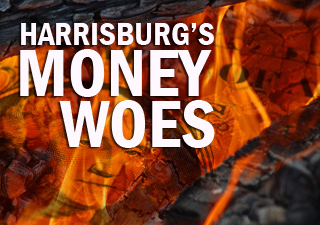After
defaulting on its incinerator bonds,
Harrisburg, PA, gets even more desperate and starts selling off pieces of itself.
William Alden wrote in huffpo 15 June 2011,
Harrisburg’s ‘Bad Deal’: City Forced To Pursue Parking System Lease Despite Fears:
 The finances of Harrisburg, Pa., are so desperate that local officials are
considering a deal they fear will ultimately make the city more miserable.
The finances of Harrisburg, Pa., are so desperate that local officials are
considering a deal they fear will ultimately make the city more miserable.
A state-appointed panel, charged with crafting a financial recovery plan
for the city, announced this week that Harrisburg must pursue the sale of
public assets to help resolve its fiscal crisis. The nearly-bankrupt state
capital, weighed down by debt more than four times the size of its budget,
“is not in control of its own destiny,” the state team said in a report.
Three years ago, confronted with a similar budget shortfall, the city
considered leasing parking garages and meters in exchange for quick
infusion of cash, but that deal was never approved. Last month, the offer
resurfaced when New York-based developer LambdaStar expressed renewed
interest. Some city leaders harbor a growing fear that Harrisburg will
be forced into a deal that will bleed its coffers over the course of
decades, after it surrenders valuable assets to a profit-driven company
with the power to raise rates on a captive base of customers.
But those misgivings may not matter, as a budget crisis chokes Harrisburg
into submission.
“This is a situation where Wall Street will get paid, and the little
guys on Main Street, taxpayers, are going to get stuck holding the bag,”
Harrisburg City Council Member Brad Koplinski said.
Couldn’t happen here, right?
Our local governments would never
hastily approve bonds that could force raising taxes or default,
would they?
Oh, right: they already did.
-jsq
 At the work session this morning, I asked Ms. Stephanie Black if she
could e-mail me a copy of the budget and she said yes. Ms. Paige Dukes
said that Ms. Black should not e-mail me the document, but I could look
at a paper copy. A paper copy could be provided to me for $0.25 per page.
I asked if there was an electronic copy and Ms. Dukes said that this document
was not available in an electronic form.
At the work session this morning, I asked Ms. Stephanie Black if she
could e-mail me a copy of the budget and she said yes. Ms. Paige Dukes
said that Ms. Black should not e-mail me the document, but I could look
at a paper copy. A paper copy could be provided to me for $0.25 per page.
I asked if there was an electronic copy and Ms. Dukes said that this document
was not available in an electronic form.








